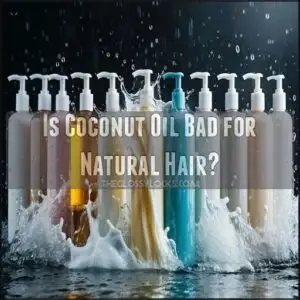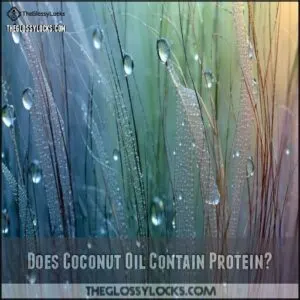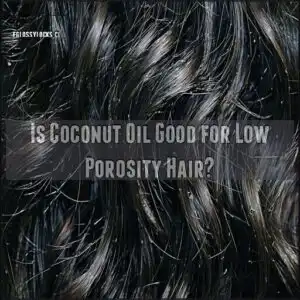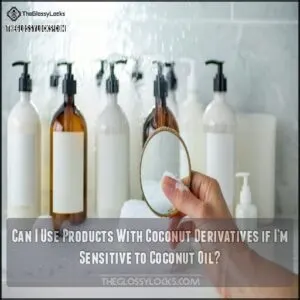This site is supported by our readers. We may earn a commission, at no cost to you, if you purchase through links.
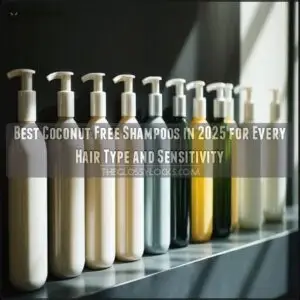
These shampoos skip coconut derivatives (often hiding as sodium lauryl sulfate or cocamidopropyl betaine) while effectively cleansing your hair.
For dry hair, try Acure Ultra Hydrating; for sensitive scalps, Real Purity Chamomile works wonders.
Jessicurl offers great options for curly hair, while The Mane Choice provides protein-balanced formulas.
Like finding the perfect pair of jeans, the right coconut-free shampoo matches your specific hair needs.
The science behind why some hair types actually perform better without coconut might surprise you, and understanding this can help you find the best coconut-free shampoo.
Table Of Contents
- Key Takeaways
- Top 8 Best Coconut Free Shampoos
- Why Most Shampoos Have Coconut
- Are Coconut-free Shampoos Right for Me?
- Is Coconut Oil Bad for Natural Hair?
- Can Coconut Oil Make Your Hair Dry?
- Does Coconut Oil Contain Protein?
- Is Coconut Oil Good for Low Porosity Hair?
- Can I Use Products With Coconut Derivatives if I’m Sensitive to Coconut Oil?
- Frequently Asked Questions (FAQs)
- What shampoos have no coconut?
- Which is the number one shampoo in the world?
- Is OGX coconut sulfate-free?
- Are Coconut-free Shampoos Effective for Curly Hair?
- Is Coconut Oil Safe to Use on the Scalp?
- Does Coconut Oil Help Reduce Hair Loss?
- How Often Should I Use Coconut-free Shampoo?
- How to identify hidden coconut ingredients?
- Can coconut sensitivity develop over time?
- Are sulfate-free and coconut-free always related?
- Conclusion
Key Takeaways
- You’ll find excellent coconut-free options in brands like Clean Kids Naturally, Elegant Rose, and ALODIA Black Soap that effectively cleanse without potentially irritating coconut derivatives.
- Your hair type matters when choosing coconut-free products—Acure Ultra Hydrating works best for dry hair, Real Purity Chamomile soothes sensitive scalps, and Jessicurl offers great solutions for curly hair.
- You should check labels carefully for hidden coconut ingredients that often appear as "coco-," "laur-," or "capry-" prefixes, or as sodium lauryl sulfate and cocamidopropyl betaine.
- You might benefit from coconut-free shampoos if you have low porosity hair, as coconut oil can cause protein overload, create buildup, and leave your hair brittle despite its popularity in haircare.
Top 8 Best Coconut Free Shampoos
If you’re searching for quality shampoos without coconut, we’ve the perfect solution for you with this curated list of the top eight.
These options are designed to meet various hair needs while addressing sensitivities, making them perfect for a healthier hair routine.
They are also suitable for individuals with specific hair care requirements, however the text does not provide this information.
Clean Kids Naturally
Clean Kids Naturally is a standout choice if you’re on the hunt for a coconut oil free shampoo.
Perfect for kids’ scalp health and great for the whole family, this natural coconut free shampoo is made with vegan ingredients and skips the usual suspects like parabens, sulfates, and artificial dyes.
It’s gentle on the hair, safe for daily use, and won’t strip strands—making it ideal for color-treated or delicate hair.
The orange burst scent adds a fun twist that kids will love, turning bath time into less of a chore.
Packed with natural ingredients, the formula moisturizes and soothes irritation, banishing dry scalp issues like dermatitis.
With its simple, yet effective approach, Clean Kids Naturally guarantees clean, healthy hair every day, especially for those coping with coconut allergies or sensitivities.
Elegant Rose Coconut Free Shampoo
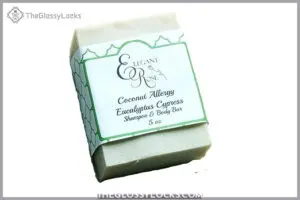
If you’re searching for a shampoo without coconut, Elegant Rose’s Eucalyptus Cypress Shampoo Bar is a gem.
Crafted with Organic Jojoba, olive oil, and avocado oil, this coconut oil free shampoo is perfect for those with allergies or sensitivities.
Its gentle lather cleans without stripping natural oils, leaving your hair soft and shiny.
This natural coconut free shampoo improves hair texture and can reduce hair loss while offering an allergen-free, soothing scent.
It’s easily a contender for the best shampoo, no coconut required.
ALODIA Black Soap
If your scalp feels weighed down by heavy products, ALODIA Black Soap might be the light, clean reset you need. Packed with organic ingredients like coco seed powder, tea tree oil, and plantain skins, this shampoo without coconut cleanses gently while protecting your natural oils.
It’s perfect for tackling scalp buildup and soothing conditions like dermatitis or alopecia. As a traditional beauty secret, it offers deep cleansing and moisturizing benefits.
Safe for color-treated hair, ALODIA’s anti-inflammatory properties make it a standout among coconutfree shampoos. Plus, the peppermint scent adds an invigorating twist.
Here’s why it shines:
- Helps reduce dandruff with tea tree oil.
- Hydrates dry, sensitive scalps without harming hair.
- Fights scalp irritation caused by product buildup.
- Vegan, cruelty-free, and coconut allergy shampoo approved.
- One 8 oz bottle lasts around 30 washes.
Real Purity Chamomile Shampoo
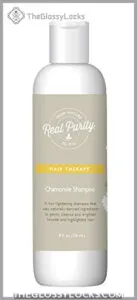
If you’re battling oily hair or looking for the best shampoo with no coconut, Real Purity Chamomile Shampoo might be your solution.
Packed with chamomile benefits, this vegan formula gently cleanses and nourishes without stripping natural oils.
It features a thoughtful ingredient analysis, including chamomile oil, aloe vera gel, lavender, and rosemary essential oils.
These work together to soothe your scalp and improve hair health, making it ideal for individuals managing sensitivities or seeking a shampoo without coconut.
It’s a great option for coconut allergy shampoo because it avoids harsh chemicals like sulfates, parabens, and phthalates.
Plus, its brightening effects leave limp strands refreshed and strong.
The light citrus-lavender scent is a bonus, and the shampoo is affordable and effective, standing out among coconut-free shampoos.
The Mane Choice

If you’re looking to repair and revitalize your hair without relying on coconut-based products, The Mane Choice Ancient Egyptian Shampoo is a top pick.
This vegan coconut free shampoo blends rare natural oils like kalahari melon seed oil and mongongo oil to strengthen strands and restore shine. Its sulfate free, coconut free formula gently cleanses while protecting and hydrating your hair.
Here’s why it stands out:
- Hair Repair: Targets breakage and split ends with nutrient-rich oils.
- Scalp Benefits: Relieves dryness and itchiness, leaving your scalp refreshed.
- Ingredient Analysis: Free of harsh chemicals, keeping hair healthier long-term.
- User Reviews: Highly rated for its softening and strengthening effects.
- Product Lineup: Complements other coconut free hair products for consistent care.
Enjoy stronger, shinier hair worry-free!
Jessicurl Gentle Lather Shampoo

Jessicurl Gentle Lather Shampoo is a game-changer for those seeking sulfate-free, coconut-free, and paraben-free options.
With an invigorating citrus lavender scent (or an unscented alternative for sensitive noses), it’s perfect for all hair types—curly locks included.
This low-poo cleanser strikes the ideal balance: it lathers well yet rinses clean, leaving no pesky residue behind.
Users love its ability to hydrate without weighing hair down, providing a soft, light finish.
Sensitive scalps will appreciate its gentle ingredient profile, designed to soothe without compromising effectiveness.
Whether you’re managing curly hair care or opting for safer, coconut-free shampoos, Jessicurl excels at turning dry, stressed tresses into healthier, moisturized strands—all in a thoughtfully sized bottle for travel-friendly convenience.
Acure Ultra Hydrating Shampoo
Acure Ultra Hydrating Shampoo offers a revivingly simple way to elevate your hair care routine.
Perfect for anyone seeking vegan hydration without sulfates, it’s packed with key ingredients like organic argan oil and pumpkin seed oil. These omega-rich components deeply nourish dry or frizzy hair, leaving it soft, shiny, and easy to manage.
Plus, the cherry scent is just right—not too strong, and it fades quickly as your hair dries.
You get all this without parabens, harsh chemicals, or coconut derivatives, making it an ideal choice for sensitive scalps or low-porosity hair types.
- Vegan hydration with organic argan oil
- Frizz reduction, promoting smoother hair
- Free of sulfates, parabens, and coconut
- Gentle on all hair types
- Affordable option with glowing user reviews
Nature Sustained Shampoo
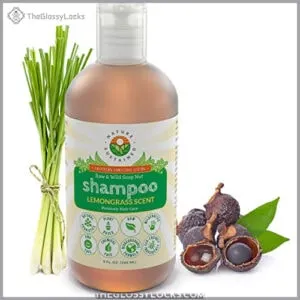
Nature Sustained Shampoo stands out with its unique blend of natural, plant-based ingredients that gently cleanse and nourish your hair.
If scalp health is a priority, this sulfate-free, coconut-free, and paraben-free shampoo is a fantastic choice.
Infused with probiotics and sustainably sourced botanicals, it tackles common issues like itching, dandruff, and excess oil while leaving your hair soft and shiny.
The eco-friendly packaging adds to its appeal, making it a win-win for your hair care routine and the planet.
The lemongrass scent is invigoratingly light, providing just the right amount of fragrance without being overpowering.
With no synthetic fragrances or preservatives, its thoughtful Ingredients Spotlight focuses on purity and effectiveness.
Whether you’re aiming for a healthier scalp or a more sustainable grooming routine, Nature Sustained Shampoo delivers results you can trust.
Try it, and enjoy the glow of well-nourished, irritation-free hair.
Why Most Shampoos Have Coconut
Coconut oil dominates shampoos for good reasons—it cleans well, lathers beautifully, and nourishes hair without the heavy feel.
Coconut oil’s reign in shampoos isn’t arbitrary—it masters the trifecta of cleansing power, luxurious foam, and lightweight nourishment.
It’s also cost-effective and offers emulsifying properties, helping blend ingredients while enhancing scent appeal. Plus, coconut derivatives like cocamidopropyl betaine create rich foam, making products appealing.
Why the buzz? Here’s why:
- Superior lather creation: Coconut delivers that satisfying foam.
- Emulsifying properties: Guarantees silky formulations.
- Affordable sourcing: Cheaper than alternatives.
- Scent appeal: Adds tropical charm.
- Marketing trends: Coconut sells.
If you’re sensitive, coconutfree shampoos are your go-to!
Are Coconut-free Shampoos Right for Me?
Not all shampoos suit everyone, especially if coconut triggers reactions like scalp irritation or allergy symptoms.
Coconut-free shampoos might be the calming solution, especially if your hair type, such as low porosity, struggles with product buildup or dryness.
Here’s why they’re worth a shot:
- Hydration: They replenish moisture without weighing down strands.
- Gentle Cleansing: Perfect for eczema or a sensitive scalp.
- Scalp Health: Reduce irritation and avoid clogging follicles.
Finding the best shampoo with no coconut guarantees care made just for you.
Is Coconut Oil Bad for Natural Hair?
Coconut oil isn’t bad for everyone, but it’s tricky.
While its benefits, like reducing protein loss, sound great, overuse can cause scalp follicle clogging, dryness, or protein overload, leaving your hair brittle.
It’s not the best for low porosity hair since it blocks moisture.
Coconut derivatives found in many shampoos are usually gentler but can still bother those with a coconut allergy. If this sounds familiar, try coconut-free shampoos with alternative oils, like argan or castor, to keep your hair balanced and healthy.
Can Coconut Oil Make Your Hair Dry?
Excessive coconut oil use can dry your hair, especially with low porosity hair or sensitivities.
Its overuse can lead to dryness, scalp buildup, or even protein overload if it blocks hydration. Understanding your hair’s needs is essential for choosing the best shampoo without coconut.
A thin layer can offer heat protection when used correctly.
Look for gentle products with these benefits:
- Hydrating ingredients like jojoba or argan oil.
- Avoid coconut derivatives, often hidden in labels.
- Promote scalp health using natural oils.
- Prevent buildup with balanced formulas.
- Ideal for coconut allergy or dry hair needs.
Read labels carefully!
Does Coconut Oil Contain Protein?
While exploring how coconut oil affects moisture levels, you might wonder about its protein content. The truth is straightforward: coconut oil doesn’t contain protein – it’s a pure fat.
During oil extraction, any proteins present in the coconut are destroyed through heat processing. This fact is essential if you’re concerned about hair protein overload, which can lead to brittleness and breakage.
Unlike coconut milk (which does contain proteins from suspended coconut flesh), properly processed coconut oil won’t contribute to protein loss or buildup in your hair.
Cold-pressed varieties might retain trace proteins, but they’re too large to penetrate the hair cuticle and affect hair strength.
Is Coconut Oil Good for Low Porosity Hair?
Low porosity hair, with its tightly closed cuticles, typically doesn’t play well with coconut oil. Despite coconut oil’s reputation as a hair care miracle, it can create more problems than solutions for low porosity strands.
- Coconut oil molecules are too large to penetrate low porosity hair’s closed cuticles
- Product buildup occurs when oil sits on the hair surface, creating a greasy appearance
- Protein overload is common since coconut oil is protein-rich, leading to brittle strands
- Alternative oils like grapeseed, jojoba, or almond oil work better for low porosity hair
- Using heat (steamer or warm towel) before oil application helps improve absorption
For those with low porosity hair seeking moisture without the buildup, coconut-free shampoos offer a practical solution to maintain scalp health while ensuring proper product absorption. A key factor is that low porosity hair struggles with moisture absorption.
Can I Use Products With Coconut Derivatives if I’m Sensitive to Coconut Oil?
If you’re sensitive to coconut oil, your relationship with coconut derivatives might be complicated. The severity of reactions varies substantially between pure coconut oil and its derivatives.
Most people with mild coconut oil sensitivity can tolerate derivatives like cetearyl alcohol or sodium cocoyl isethionate, as processing often reduces allergenicity. However, those with severe coconut allergies should approach with caution.
Before trying coconut-free shampoos containing derivatives, conduct a patch test on your inner wrist. Understanding natural ingredient benefits can help minimize adverse reactions.
Always check ingredient labels carefully—terms with prefixes like "coco-," "laur-," and "capry-" typically indicate coconut-derived components.
Frequently Asked Questions (FAQs)
What shampoos have no coconut?
Just when you’ve been searching, these coconut-free shampoos work well for sensitive scalps: Alodia Black Soap, Elegant Rose, Clean Kids Naturally, Real Purity Chamomile, The Mane Choice, Jessicurl, and Acure Ultra Hydrating.
Which is the number one shampoo in the world?
You’ll find that Malin + Goetz shampoo claims the top spot worldwide. It’s vegan, cruelty-free, delivers consistent moisture to brittle ends, and leaves a fresh botanical scent you’ll love.
Is OGX coconut sulfate-free?
Like waves washing through your hair, OGX coconut shampoos aren’t typically sulfate-free.
Most contain sodium C14-16 olefin sulfonate instead of traditional sulfates, which is gentler but still technically a sulfate derivative.
Are Coconut-free Shampoos Effective for Curly Hair?
Yes, coconut-free shampoos work well for curly hair.
You’ll find options with argan oil, shea butter, and other hydrating ingredients that define your curls without protein overload.
Jessicurl’s Gentle Lather is particularly effective.
Is Coconut Oil Safe to Use on the Scalp?
One person’s balm is another’s burden.
Coconut oil can be safe for your scalp, providing moisture and antifungal benefits.
However, it may cause buildup, clog follicles, or trigger allergic reactions in some individuals.
Does Coconut Oil Help Reduce Hair Loss?
Research shows coconut oil may reduce hair loss by preventing protein loss and moisturizing the scalp.
However, it’s not suitable for all hair types and might worsen problems for those with low porosity hair.
How Often Should I Use Coconut-free Shampoo?
Wash your hair with coconut-free shampoo 2-3 times weekly, adjusting based on your hair type.
Oily scalps might need more frequent washing, while dry hair benefits from fewer washes to preserve natural oils.
How to identify hidden coconut ingredients?
Like a detective scanning fine print, you’ll need to check for terms like "cocos nucifera," "sodium cocoate," "cocamidopropyl betaine," and "coco-derivatives" on labels to avoid hidden coconut ingredients.
Can coconut sensitivity develop over time?
Yes, you can develop coconut sensitivity over time.
Your body’s immune system may gradually build a reaction to proteins in coconut products, turning what was once a favorite ingredient into an irritant for your scalp.
Are sulfate-free and coconut-free always related?
No, they’re not always related.
Sulfate-free products can still contain coconut derivatives, while coconut-free shampoos might contain sulfates.
You’ll need to check ingredients carefully for both specifications if you’re avoiding both sulfates.
Conclusion
Finding the right coconut-free shampoo is like discovering a secret door to healthier hair.
Whether you’re avoiding coconut due to allergies or seeking better performance for your specific hair type, the best coconut free shampoos we’ve highlighted offer effective alternatives.
You’ll notice the difference as your hair responds to formulations designed without common coconut derivatives.
Trust your hair’s feedback, experiment with different options, and you’ll discover which coconut-free formula truly brings out your hair’s natural beauty.
This process will help you find a shampoo that works well for your hair type, and by doing so, you’ll be able to see the positive impact on your hair’s health.
- https://pubmed.ncbi.nlm.nih.gov/32602684/
- https://www.healthline.com/health/beauty-skin-care/too-much-protein-in-hair
- https://www.chagrinvalleysoapandsalve.com/p/shampoo-bar-olive-babassu/
- https://www.uncleharrys.com/mild-mint-toothpaste-3-oz-glass-jar
- https://www.ftc.gov/business-guidance/advertising-marketing/made-in-usa

